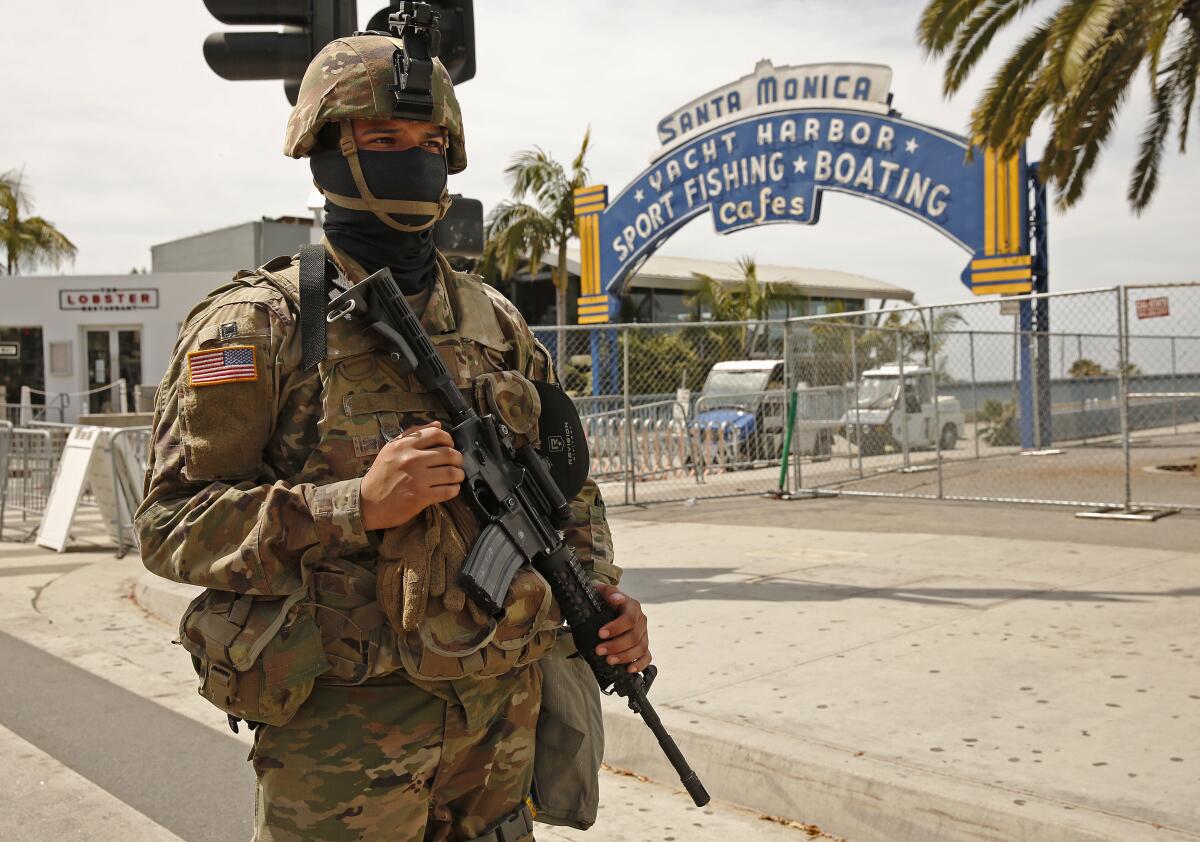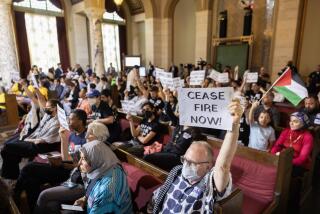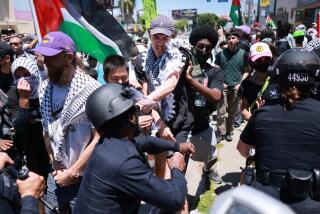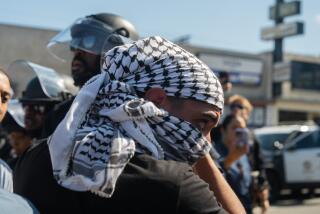Santa Monica mayor and police chief face anger from protesters: ‘You called in the National Guard!’

A Friday afternoon protest at Santa Monica City Hall turned into a raucous Q&A between peaceful protesters and the city police chief, interim city manager and mayor.
Mayor Kevin McKeown and interim City Manager Lane Dilg attempted to address protesters and were met with questions about the use of tear gas on demonstrators last Sunday in Santa Monica and calls to cut the city’s police budget.
“We will look at the actions of Sunday; we will determine what we can do to keep our community safe and facilitate peaceful protest,” Dilg said.
“You called in the National Guard!” one protester shouted.
Another asked why the streets were shut down.
“Hey people, do you want to hear the answers?” McKeown asked.
Police Chief Cynthia Renaud said the list of names of people who died at the hands of police doesn’t seem to end, but they stop in Santa Monica.
“I believe in the peace; I believe in the community I serve,” she said.
Then she, the mayor and others took a knee in solidarity with the protesters. Some in the crowd decried the moment as a photo op. One protester said if Renaud couldn’t admit that violence was used against nonviolent protesters then she should resign.
Dilg encouraged people to send comments to a Tuesday council meeting and to vote.
“We are with you; we welcome you to Santa Monica,” she said, to boos.
A young passerby, Chanel Nicole Miller, 19, assumed the role of emcee during the heated exchange between demonstrators and officials. Miller said she was on her way to work as a line cook when she stopped by the demonstration. She said she stepped forward when she heard officials talking.
“When the mayor got up there and started cursing, getting red, yelling, showing his ignorance and pain that he didn’t know how to express, I felt like I had to say something,” she said.
Miller stood up and described her experience as a resident of the city and the discrimination she has faced as a black woman. She said she felt like the crowd wanted her to speak up.
“I had to do my duty to help facilitate for our people,” she said.
Miller criticized officials for failing to answer questions or acknowledging that the city used excessive force against protesters last Sunday.
“They don’t want to answer the tough questions; they don’t want to battle the hardships that we go through every single day,” she said.
Miller said she believes the best way for people to be heard is through policies and voting. Miller said her experience at the protest was a significant moment for her.
“We can yell, we can express our anger, we can loot, we can vandalize ... but that would leave us without a city, police that don’t like us and our voices going unheard,” she said. “Being that voice for the people, it definitely was a wake-up call. This is what I need to do.”
Other demonstrators voiced similar thoughts.
Madison Garrett, 21, a college student, arrived early for her third protest this week. A post circulating on social media said the event was organized by alumni of Santa Monica High School, from which she graduated in 2017.
Garrett said the recent protests have shown people doing what they need to do to be heard.
“Basically, we’ve been going through this for hundreds of years, systematic oppression, and once it gets to a boiling point of being unheard, silence doesn’t work anymore,” she said.
She criticized media coverage that she said has focused on rioting and looting. “They’re not showing the police gassing innocent people,” she said. “They’re not showing you the singing and dancing on the street.”
Garrett said there has been a sense of camaraderie among protesters. She has offered to give people rides home and seen people handing out water and snacks. Garrett said it’s hard to maintain social distance at a protest, and that is “definitely at the back of my mind.” But she’s trying to be safe — she was wearing a surgical mask with “I can’t breathe” written in black marker — and protesting is worth breaking quarantine.
“I saw someone else say that you’re either going to get killed by a police officer or you’re going to get killed by COVID, and it’s your decision to make which one you choose,” she said.
More to Read
Sign up for Essential California
The most important California stories and recommendations in your inbox every morning.
You may occasionally receive promotional content from the Los Angeles Times.











